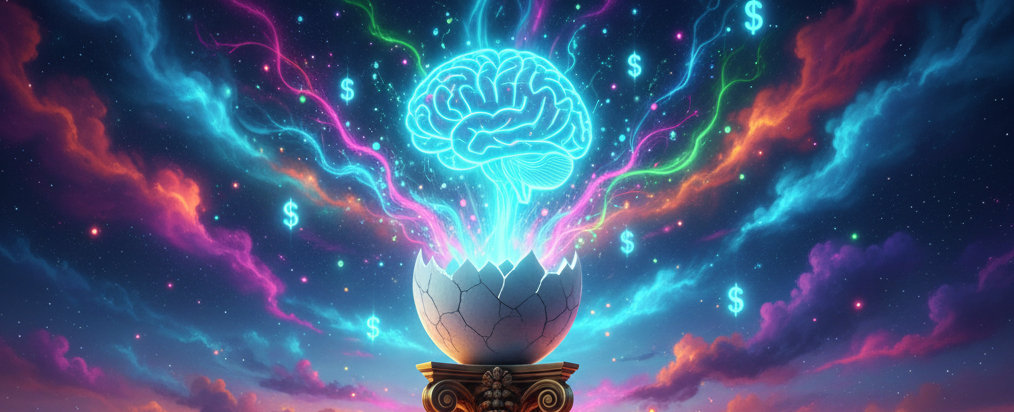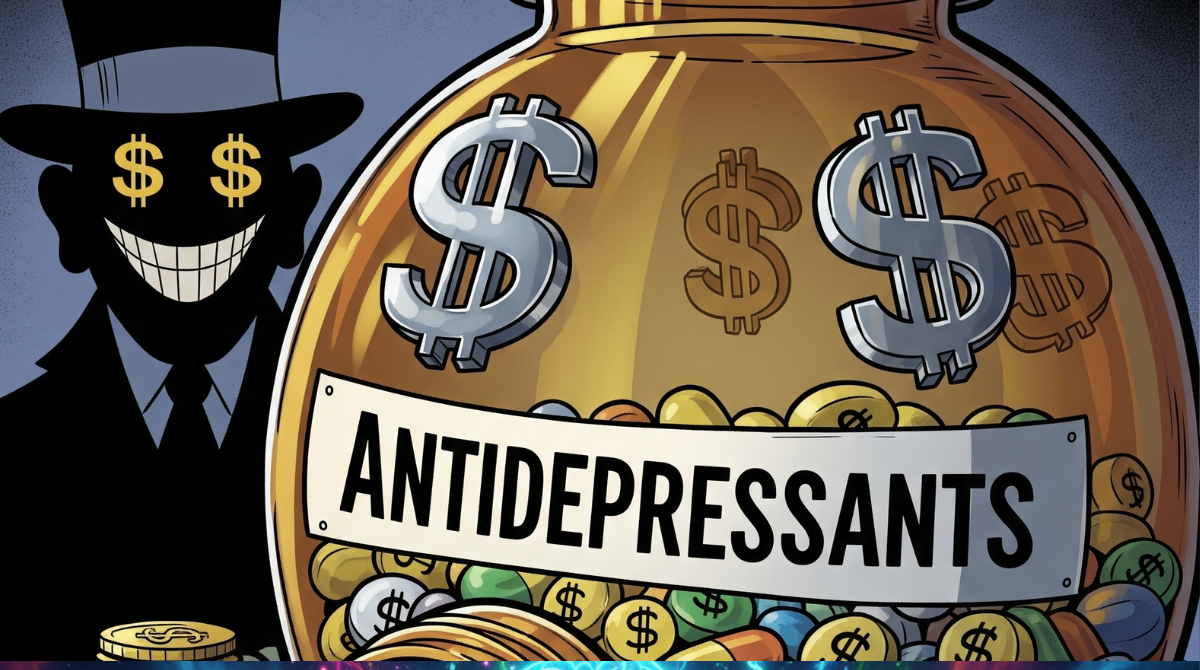The Antidepressant Myth: A “Miracle” Built on Marketing, Money, and Misleading Science
Recently, I wrote an article breaking down the efficacy of antidepressants versus placebo — and how the supposed benefits often don’t hold up under closer scientific scrutiny. If you haven’t read that piece yet, you can find it here: Antidepressants vs Placebo: What the Research Really Shows.
This new article builds off that one, taking a deeper look at the origin story of Prozac, the billions antidepressants have generated for Big Pharma, the real-world outcomes (or lack thereof), and the lasting impact this pill-popping mentality has had on people — especially kids.
When I look back at the way antidepressants were sold to the world, it honestly blows my mind. We were told depression came from a “chemical imbalance” — a neat, simple explanation that made it sound like your brain was low on serotonin the same way your car might be low on oil. And the fix? Pop a pill, balance restored, problem solved.
It sounded scientific. It sounded hopeful. And for millions of people desperate for relief, it sounded like the truth.
But here’s the reality: that entire story was never backed by solid science. Antidepressants don’t correct any proven imbalance. What they did do was launch one of the most profitable drug markets in history, while depression rates kept climbing and people were left dealing with side effects that often felt worse than the problem itself.
They Don’t Even Know How They Work
SSRIs like Prozac change serotonin in your brain almost immediately. But the so-called “benefits” don’t show up for weeks — if they show up at all. If the chemical imbalance theory was true, you’d feel better the first day.
-
A 2022 umbrella review in Molecular Psychiatry admitted:
“There is no consistent evidence of an association between serotonin and depression.”
Read it here -
Even today, medical bodies are backtracking. The UK’s NICE guidelines now say antidepressants shouldn’t even be offered as first-line treatment for less severe depression (The Lancet, 2025).
Read it here
So the very biological story used to sell antidepressants has collapsed.
What I Heard Straight From the Source
This part is personal. My company once worked with a man struggling with alcohol — and he happened to be one of the original founders of Prozac. He told me straight up: the name Prozac and the whole “miracle antidepressant” idea weren’t born in a lab. They were cooked up one night over coffee.
Think about that. The drug that defined an entire era of mental health treatment was branded into existence more than it was discovered.
Follow the Money
This isn’t just about bad science. It’s about profits.
-
Prozac alone made over US$22 billion for Eli Lilly before it went generic. At its peak, it pulled in US$2.6 billion a year.
-
Even today, fluoxetine (Prozac’s generic) still rakes in close to US$2 billion annually. See sales data
-
The global antidepressant market was US$11.67 billion in 2019, jumped to US$14.93 billion in 2020, and is on track to hit US$26.9 billion by 2033. Market report
-
Add it all up over decades, and pharma has pocketed hundreds of billions of dollars — easily in the US$200–500 billion range.
Meanwhile, depression hasn’t gone down. In fact, it’s gone up.
Depression Rates Haven’t Improved
Despite decades of pill-pushing and skyrocketing profits:
-
In the U.S., antidepressant use rose from 10.6% of adults (2009–2010) to 13.8% in 2017–2018. ** CDC data
-
By 2021–2023, about 13.1% of U.S. adolescents and adults reported depression symptoms in the past two weeks. Among young adults (20–39), that number was nearly 16.6%. ** CDC brief
-
In 2022, about 21.4% of U.S. adults reported depression symptoms in the prior two weeks. ** CDC report
-
Globally, cases of depression rose from 182 million in 1990 to nearly 290 million in 2019. Prevalence climbed from ~4.5% in 1990 to ~5.7% today. ** WHO fact sheet
So while antidepressant prescriptions exploded, depression did not go away — it got worse.
The Side Effects Nobody Advertises
I’ve heard it firsthand from people, and the research backs it up: the side effects are brutal.
-
Sexual dysfunction (and sometimes permanent)
-
Weight gain and metabolic problems
-
Feeling emotionally numb, not happy
-
Withdrawal symptoms when tapering (brain zaps, dizziness, anxiety)
-
Higher suicide risk in young people
And newer studies confirm these drugs are less well tolerated than placebo. JAMA Psychiatry, 2023
What the Research Actually Shows
-
Kirsch et al., 2008 (PLoS Medicine): Antidepressants are basically no better than placebo in mild/moderate depression.
-
Turner et al., 2008 (NEJM): Trials with bad results were buried, good ones hyped.
-
STAR*D trial (Pigott, 2010): After years of drug-hopping, only 13% achieved lasting remission.
-
Jakobsen et al., 2020 (BMJ Evidence-Based Medicine): Benefits are “minimal and possibly without clinical importance” for most patients. Read it
-
Alemi et al., 2021: Roughly 60% of people don’t benefit from their first antidepressant. ScienceDirect
-
Verhoeven et al., 2023: Exercise works just as well as antidepressants for mild/moderate depression, without the side effects. Study link
-
Urata et al., 2025: For mild depression, antidepressants offer no real advantage over placebo. Wiley Online Library
So when you cut through the noise, the pattern is obvious: the science is weak, the side effects are heavy, and the “success stories” are padded by selective publishing and marketing spin.
The Real Damage: Teaching People They’re “Broken”
The worst part about this whole antidepressant story isn’t just the weak science or the billions pocketed by Big Pharma. It’s the mentality it created: the belief that if you’re sad, if life feels heavy, if you’re struggling — it must mean you’re broken. And the only way to be “fixed” is with a pill.
That idea has been devastating, especially for kids. It teaches them that normal human ups and downs are a disorder, that their feelings are flaws, and that their only hope is in a prescription bottle. That’s not just bad science — it’s bad for the human spirit.
What Actually Creates Happiness
Here’s what I’ve seen over decades of working with people battling addiction and other struggles: everyone goes through highs and lows. And yes, sometimes the lows stick around long enough that they feel like permanent habits of thought. But like any habit, those thought patterns can be changed.
Not with a pill. But with choices.
Happiness doesn’t come from chemicals in a capsule. It comes from discovering what truly drives you — what lights you up, what gives your life meaning, what you’re passionate about. When you start asking why life feels like it sucks and really face that question, you can start making the changes that lead to real happiness.
The Universal Truth About Human Behavior
In all my years helping people, I’ve noticed one universal, unbreakable truth: all humans move in the direction of what they believe will make them happy. Sometimes that pursuit takes people down destructive paths — even toward behaviors that later cause guilt, shame, or depression. But the engine is always the same: we’re wired to seek happiness.
The real solution isn’t in numbing that drive with drugs. It’s in redirecting it — toward things that genuinely fulfill us. Toward choices that build us up instead of breaking us down.
Final Word
Antidepressants promised miracles, but they delivered side effects, dependency, and disappointment. What they really did was create generations of people who think their sadness means they’re defective.
The truth is the opposite: you don’t need to be “fixed.” You need to discover what gives your life purpose and lean into it. Happiness isn’t handed out by pharmaceutical companies. It’s built, every day, by the choices you make and the passions you pursue.
That’s not just my opinion — it’s what I’ve watched transform lives time and time again.
Big Pharma isn’t curing us. They’re monetizing our despair.


